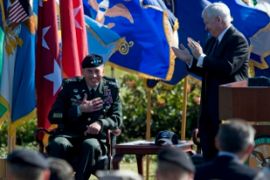Petraeus takes over US Centcom
General who led Iraq troop “surge” will look to tackling war in Afghanistan.

Balancing act
Some experts say Petaeus will continue the strategy he used in Iraq of balancing military action with diplomacy on the broader stage.
“He would rather [problems] be resolved diplomatically … but he’s a person who’s not afraid to use violence,” Mark Perry, a military analyst, told Al Jazeera.
“When there is a real threat to Americans, I think the military won’t hesitate to strike.”
Petraeus said at the Tampa ceremony: “From trans-national extremist organisations and industrial-strength insurgencies to weapons proliferation, a rise in piracy and persistent ethno-sectarian conflict, the Centcom [Central Command] area contains innumerable challenges.
“Addressing these challenges requires comprehensive approaches that employ the whole of our government’s capabilities,” he said, alluding to a need to more fully involve the US state department and other governmental agencies.
“This is necessary not just to resolve pressing short-term issues, but to address, over time, the underlying conditions that give rise to such serious security challenges,” he said.
Afghan war
The four-star general is set to leave on Saturday to visit the regions now under his command.
Petraeus’s most pressing tasks include trying to improve US fortunes in the war in Afghanistan and dealing with pro-Taliban and al-Qaeda forces across the border in Pakistan.
He will also have to balance troop cuts in Iraq while meeting US commanders’ requests to deploy more forces to Afghanistan.
Petraeus did three tours of duty in Iraq as commander of the 101st Airborne Division and later spent more than a year heading a programme to train Iraqi security forces.
The army general, who holds a doctorate in international relations from Princeton University, was approached for the role after Navy Admiral William Fallon stepped down hastily last March.
Fallon quit after Esquire magazine published an article painting him as the lone US administration voice against conducting military action in Iran.